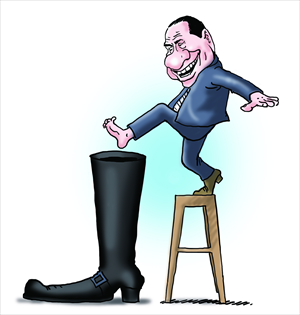Berlusconi's flair won't win him votes in new political landscape

Wear something red, throw away something old. That is the traditional way to greet the new year in Italy, a tradition that Silvio Berlusconi, Italy's four-time prime minister, may not entirely appreciate this time.
The announcement of his intention to run once more, after the resignation of Prime Minister Mario Monti earlier in December, was not welcomed as he might have expected.
Criticism of the "old" politics and specifically the controversial figure of the former leader seems to be the leading opinion during these Christmas holidays, not only among the general public, but also from Berlusconi allies and from Monti's government that, until a few weeks ago, could count on Berlusconi's MPs' votes in Parliament.
According to a recent Ipsos poll, 38 percent of Italians blame him and his government for the Italian economic crisis. According to the same source, 40 percent are not sure or blame every political party, 13 percent Monti's government and 9 percent the left-wing party.
As for the hypothetical electoral results, Berlusconi would get only 19 percent of the preferences, against 38 percent for Pier Luigi Bersani, left-wing party leader and 27 percent are undecided. This is far from the numbers he was able to move a few years ago.
Italians are used to Berlusconi's coups de théâtre in moments of uncertainty, and probably not many were surprised when in the past few weeks he appeared in the media with contrasting statements, first retiring from the political arena, then running again for the elections "for the sake of Italy;" first supporting Monti as future leader of the "moderates", or maybe not, as he was a disaster for Italy.
Berlusconi also declared his intention to establish, if elected, a parliamentary enquiry commission to investigate what he calls an international plot against his government that used "forged" bad economic results to force him to resign, an investigation that should include the highest officials of the state, including President Giorgio Napolitano, probably the most respected political figure in Italy, who strongly endorsed Monti's role as new prime minister after Berlusconi's resignation. "Berlusconi's logic confuses me," was Monti's surprisingly direct reaction.
What Berlusconi got us used to is his use of the media to stay on the scene. No matter how they talk about him, as long as they talk about him, seems to be his strategy, which is often a winning one.
During the holidays, the public attention seemed to be focused on his ex-wife and the 100,000 euro ($131,200) per day check she got after her divorce, quite a sum in an Italy where taxes are expected to reach 45.8 percent in 2013, strangling the local economy.
But Berlusconi is back on TV with his evergreen promise to reduce taxes. The question is, what was he doing during his four terms as prime minister?
But it doesn't seem to matter now. With the news of his multi-millionaire ex-wife now archived, the attention is now on his new girlfriend, a 27-year-old ex-showgirl from "Telecafone," a trashy program on a local Naples TV station.
With Mario Monti actively participating in the electoral campaign as prime ministerial candidate, and the PD, a left-wing party, gaining consensus thanks to the conflicts within the PDL, a right-wing party, Berlusconi will have to tell more to his voters than the jokes he was famous for with international leaders.
Berlusconi will also have to work hard to keep his center-right alliance, with the Lega Nord, the secessionist party and strongest ally in the north, already ruling itself out of a future coalition.
In the past year, Italy has gained back its lost credibility in the international markets and found its role, together with Germany and France, in the European decision-making process, thanks mostly to the highly respected figure of Mario Monti. But what the prime minister was not able to fulfill was the need for social equity.
Many Italians have seen their wallets drastically shrink under a wave of new taxes, while little or nothing has changed for strong powers like the banks or the Vatican. Many would argue that those measures were necessary to save Italy from economic meltdown, but the lack of equity will be fertile ground for populist propaganda.
With almost two months to go before the elections, Berlusconi will inevitably use those arguments to gain consensus, but looking at the polls, a growing number of Italians seem to have already decided to wear something red and throw away something old, for a better 2013.
The author is a freelance journalist based in Bari, Italy. lovecchio.mauro@gmail.com